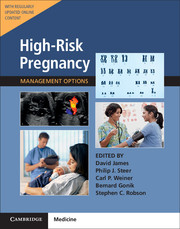Book contents
- Frontmatter
- Contents
- List of Contributors
- Preface
- Section 1 Prepregnancy Problems
- Section 2 Early Prenatal Problems
- Section 3 Late Prenatal – Fetal Problems
- Section 4 Problems Associated with Infection
- Section 5 Late Pregnancy – Maternal Problems
- 30 Substance Misuse in Pregnancy
- 31 Medication in Pregnancy
- 32 Hypertension in Pregnancy
- 33 Cardiac Disease in Pregnancy
- 34 Respiratory Disease in Pregnancy
- 35 Anemia and White Blood Cell Disorders in Pregnancy
- 36 Hematological Malignancies in Pregnancy
- 37 Thrombocytopenia and Bleeding Disorders in Pregnancy
- 38 Disorders of Coagulation in Pregnancy
- 39 Autoimmune Disease in Pregnancy
- 40 Diabetes in Pregnancy
- 41 Thyroid Disease in Pregnancy
- 42 Pituitary and Adrenal Disease in Pregnancy
- 43 Gastrointestinal and Liver Diseases in Pregnancy
- 44 Neurologic Complications in Pregnancy
- 45 Renal Disorders in Pregnancy
- 46 Spine and Joint Disorders in Pregnancy
- 47 Skin Disease in Pregnancy
- 48 Malignant Disease in Pregnancy
- 49 Pregnancy After Transplantation
- 50 Trauma in Pregnancy
- 51 Mental Health Disorders in Pregnancy
- Section 6 Late Prenatal – Obstetric Problems
- Section 7 Postnatal Problems
- Section 8 Normal Values
- Index
31 - Medication in Pregnancy
from Section 5 - Late Pregnancy – Maternal Problems
- Frontmatter
- Contents
- List of Contributors
- Preface
- Section 1 Prepregnancy Problems
- Section 2 Early Prenatal Problems
- Section 3 Late Prenatal – Fetal Problems
- Section 4 Problems Associated with Infection
- Section 5 Late Pregnancy – Maternal Problems
- 30 Substance Misuse in Pregnancy
- 31 Medication in Pregnancy
- 32 Hypertension in Pregnancy
- 33 Cardiac Disease in Pregnancy
- 34 Respiratory Disease in Pregnancy
- 35 Anemia and White Blood Cell Disorders in Pregnancy
- 36 Hematological Malignancies in Pregnancy
- 37 Thrombocytopenia and Bleeding Disorders in Pregnancy
- 38 Disorders of Coagulation in Pregnancy
- 39 Autoimmune Disease in Pregnancy
- 40 Diabetes in Pregnancy
- 41 Thyroid Disease in Pregnancy
- 42 Pituitary and Adrenal Disease in Pregnancy
- 43 Gastrointestinal and Liver Diseases in Pregnancy
- 44 Neurologic Complications in Pregnancy
- 45 Renal Disorders in Pregnancy
- 46 Spine and Joint Disorders in Pregnancy
- 47 Skin Disease in Pregnancy
- 48 Malignant Disease in Pregnancy
- 49 Pregnancy After Transplantation
- 50 Trauma in Pregnancy
- 51 Mental Health Disorders in Pregnancy
- Section 6 Late Prenatal – Obstetric Problems
- Section 7 Postnatal Problems
- Section 8 Normal Values
- Index
Summary
Introduction
Drug use during pregnancy and lactation remain underdeveloped areas of clinical pharmacology and drug research. Pregnancy risk factors together with an increased incidence of chronic diseases and a rise in the average maternal age predict medication use will continue to rise during gestation. Common exposure categories include over-the-counter (OTC) medication, psychiatric agents, gastrointestinal medications, herbals, vitamins, antibiotics, and topical products. Only a few medications have been tested specifically for safety and efficacy during human gestation. Profound physiologic changes occur during both normal and pathologic pregnancy that may dramatically alter drug clearance, efficacy, and safety. Under such circumstances, the danger of a drug to mothers, their fetuses, and nursing infants cannot be determined with any confidence until it has been widely used. It is important that women with medical disorders such as diabetes, hypertension, epilepsy, and inflammatory bowel disease continue necessary therapy while pregnant. Unfortunately, many physicians stop or delay medically important agents precisely because of the lack of information. Innovative research in genomics and proteomics should facilitate the development of medications exponentially as part of the new scientific field of “theranostics” – an amalgam of diagnostics and therapeutics whereby diagnosis and treatment are personalized for individual patients. Theranostics holds great potential for personalized medicine, especially in pregnant women who are in desperate need of tailored medical treatments. In this chapter, we seek to provide a general but concise resource of drugs commonly used during pregnancy and lactation. It is important clinicians become familiar with all the aspects of the drugs they recommend and consult with a maternal–fetal medicine specialist, when appropriate, so that the best possible evidence-based counseling and treatments are provided.
Maternal Physiologic Adaptation to Pregnancy
Pregnancy is characterized by profound changes in cardiovascular, respiratory, renal, gastrointestinal, and endocrine systems. These changes begin early and evolve steadily. By 6–8 weeks’ gestation, the plasma volume begins to rise, reaching 50% above the nonpregnant level by the end of the third trimester. Given this increase in the extracellular space and total body water, physiologic dilution occurs, which may explain some loss of drug efficacy during pregnancy.
- Type
- Chapter
- Information
- High-Risk Pregnancy: Management OptionsFive-Year Institutional Subscription with Online Updates, pp. 808 - 846Publisher: Cambridge University PressFirst published in: 2017



